Dune: Part One
That's a Spicy meatball!
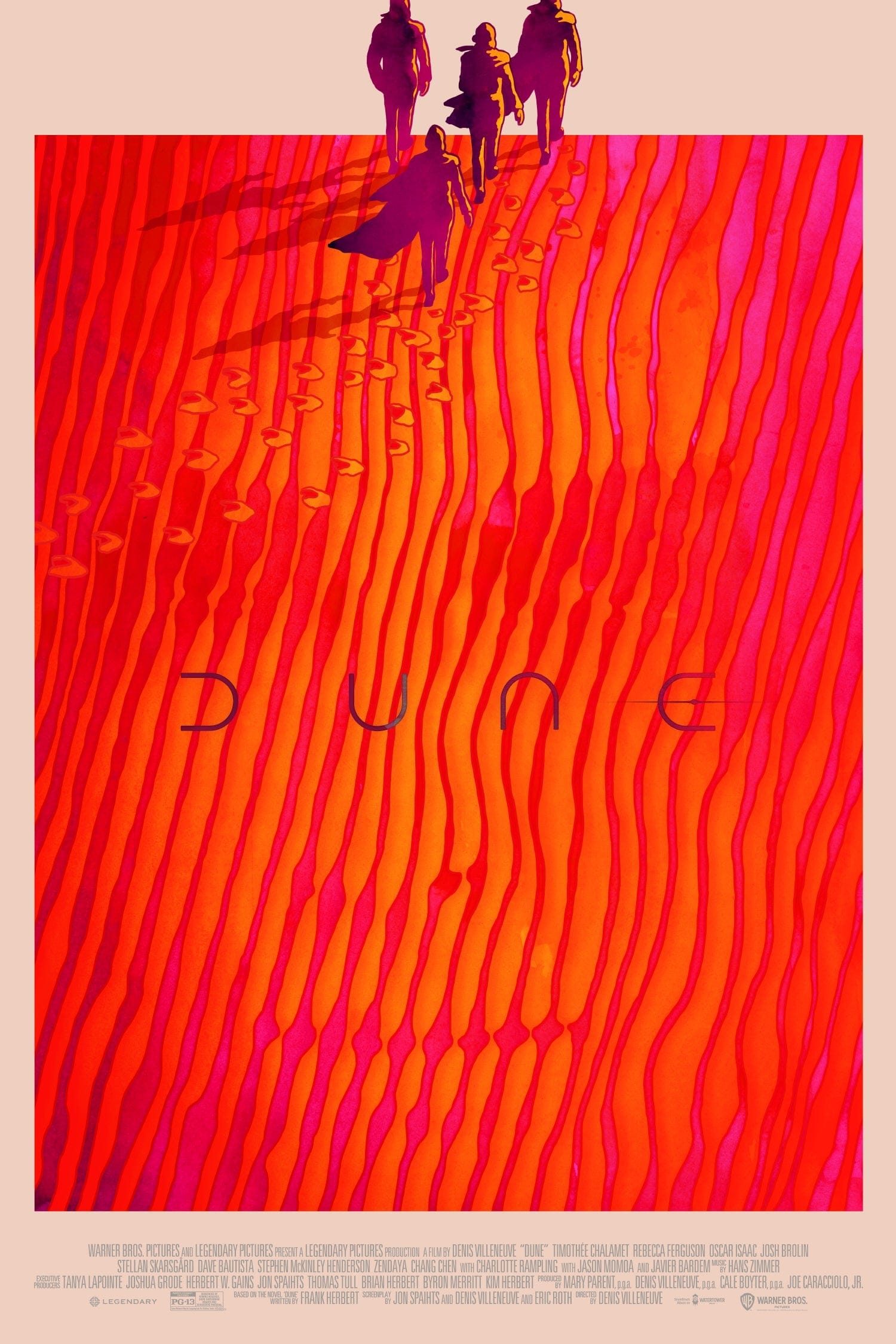
In the far-flung future of the year 10,192, there is a brilliant and gifted young man named Paul Atreides. The son and heir to House Atreides of the planet Caladan, one of the Great Houses of the Landsraad, he has born with a destiny before him that is beyond his understanding. When the Emperor gifts the poisoned chalice of the planet Arrakis to his family to oversee, Paul must travel to this, the most dangerous, and also the most important, planet in the universe, and meet this destiny. Thus, as the wheels of ancient prophecy begin to turn, and across the Known Universe, knives are drawn in the darkness between the stars, so begins a time of great change, the fall of the Corrino Empire, and the rise of the Atreides Empire.
Dune is set in humanity’s distant future, where hereditary rulers sit atop an interstellar empire, controlling the various noble houses who control their planetary fiefs. It’s the story of young Paul Atreides, whose family, the victims of a jealous and covetous game of political brinksmanship, accept the stewardship of the desert planet Arrakis. A largely inhospitable and sparsely populated desert wasteland, Arrakis is the only source anywhere of a substance called The Spide Melange, or just "spice.”

Spice is a psychotropic drug that not only extends life and enhances mental abilities, it is also a necessary component of space travel, providing a kind of multidimensional awareness and foresight to the Guild Navigators, the super-evolved group of humans who are the only ones capable of piloting the great starships across the vast reaches of Interstellar Imperial Space.
It’s like if Paprika occurred naturally in the desert, because of worm poop, and it can not only be used like peyote, it can also be used for jet fuel. Also, it’s the only jet fuel available, and it only occurs in one place.
That trade and travel and power are all so wholly dependant upon spice makes it the most important, and the most financially-enriching, resource in the Known Universe. Since spice can only be produced on Arrakis, control of the planet is a dangerous, but very lucrative position. It’s dangerous not just due to the rebellious native population, who want all of the invading colonists from the stars dead, but also from every seat of power in existence, including the Emperor himself, all of whom covet the riches and power that the control of the spice brings. The story of Dune explores the intersection of politics, capitalism, and religion as a bloated and fracturing empire bickers and wars, sliding irrevocably into chaos, like a bubbling pot finally boiling over.
In a nutshell, there’s a lot of social commentary going on here, in case you haven’t noticed already.
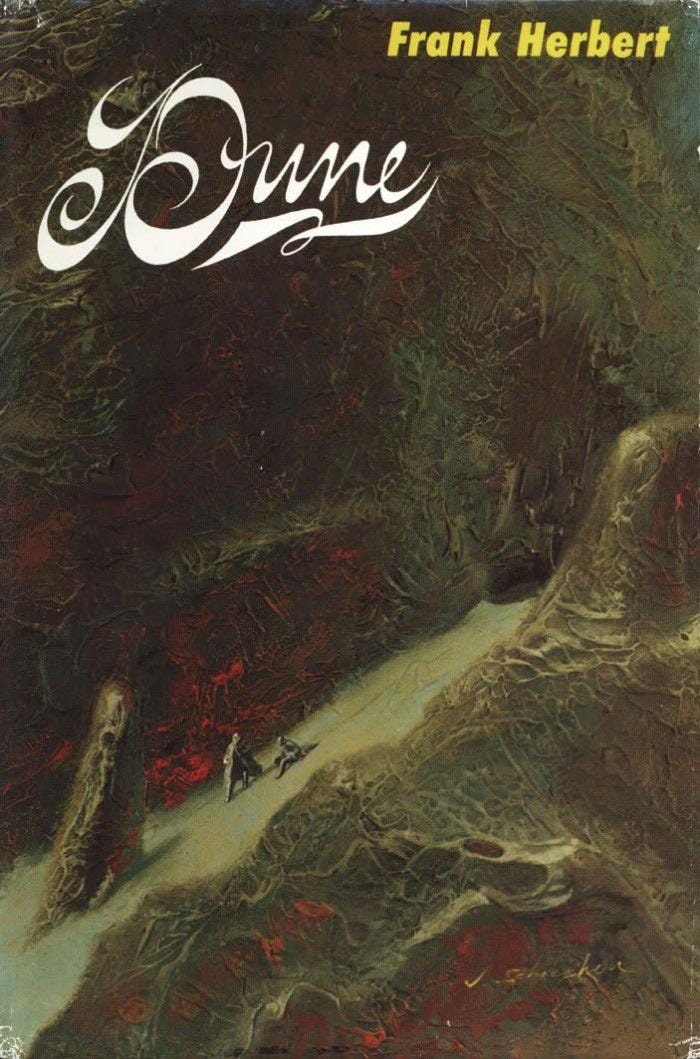
Frank Herbert’s Dune was originally published in 1965.
A futuristic, anti-corporate, pro-eco-radicalism, and Islamophilic geopolitical allegory, it is frequently described as the best-selling science fiction novel in history, winning the very first Nebula Award for Best Novel, as well as tying for the Hugo, in 1966. Dune is not just one of the ur-sources of a lot of modern day sci-fi, it’s also long been a holy grail for Hollywood, and there have been multiple attempts to adapt this book in a way that is both critically successful, and most importantly to the studios, financially successful too.
They haven’t panned out.
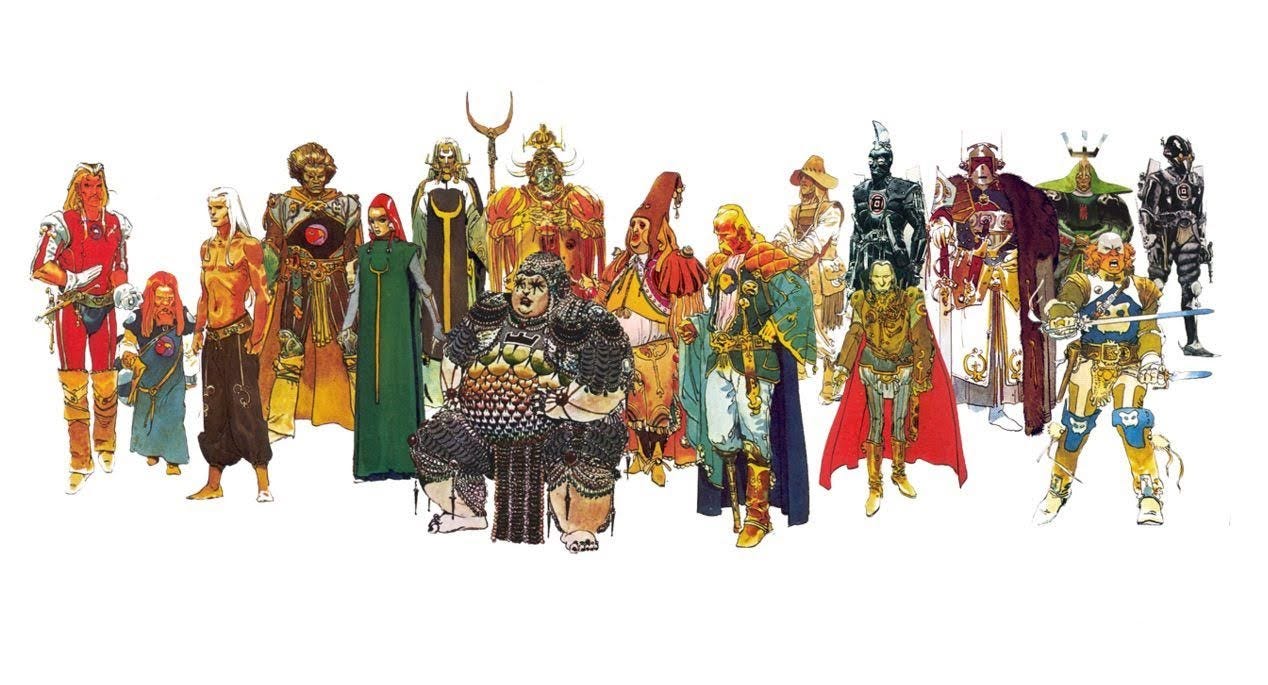
Writer/director Alejandro Jodorowsky tried in 1973. It never happened. It was just too crazy of a dream, but his lookbook, filled with notes, and concept art by such artists as H.R. Giger and Moebius (as detailed in the documentary Jodorowsky's Dune) famously went on to influece tons of now classic genre films, like Star Wars, the Alien series, Terminator, on and on. That’s amazing to think about, and completely understandable once you take a look at some of that concept art.
But while Jodorowsky’s wild version of Dune, much like Angela Bowie’s Daredevil, would’ve been an incredibly weird and wonderful little artifact that would’ve been amazing to see, if we’re being honest, it also would’ve been absolute shit. An absolute nonsensical acid-trip mishmash of half-baked garbage. Just terrible.
But amazing too. What a thing it would have been to see…
Anway, the designs are so amazing, and so influential on so many different franchises, once you know what you’re looking at, you see them everywhere. Of course, now we’re living in the era where creators are totally aware of this, and as a result, much like the Wilheim Scream, they’re just straight up using them all the time now. Still, it’s really eye-opening to go back to some of these classic films and see just how much of an integral part of these films’ DNA the Jodorowsky designs and ideas are.
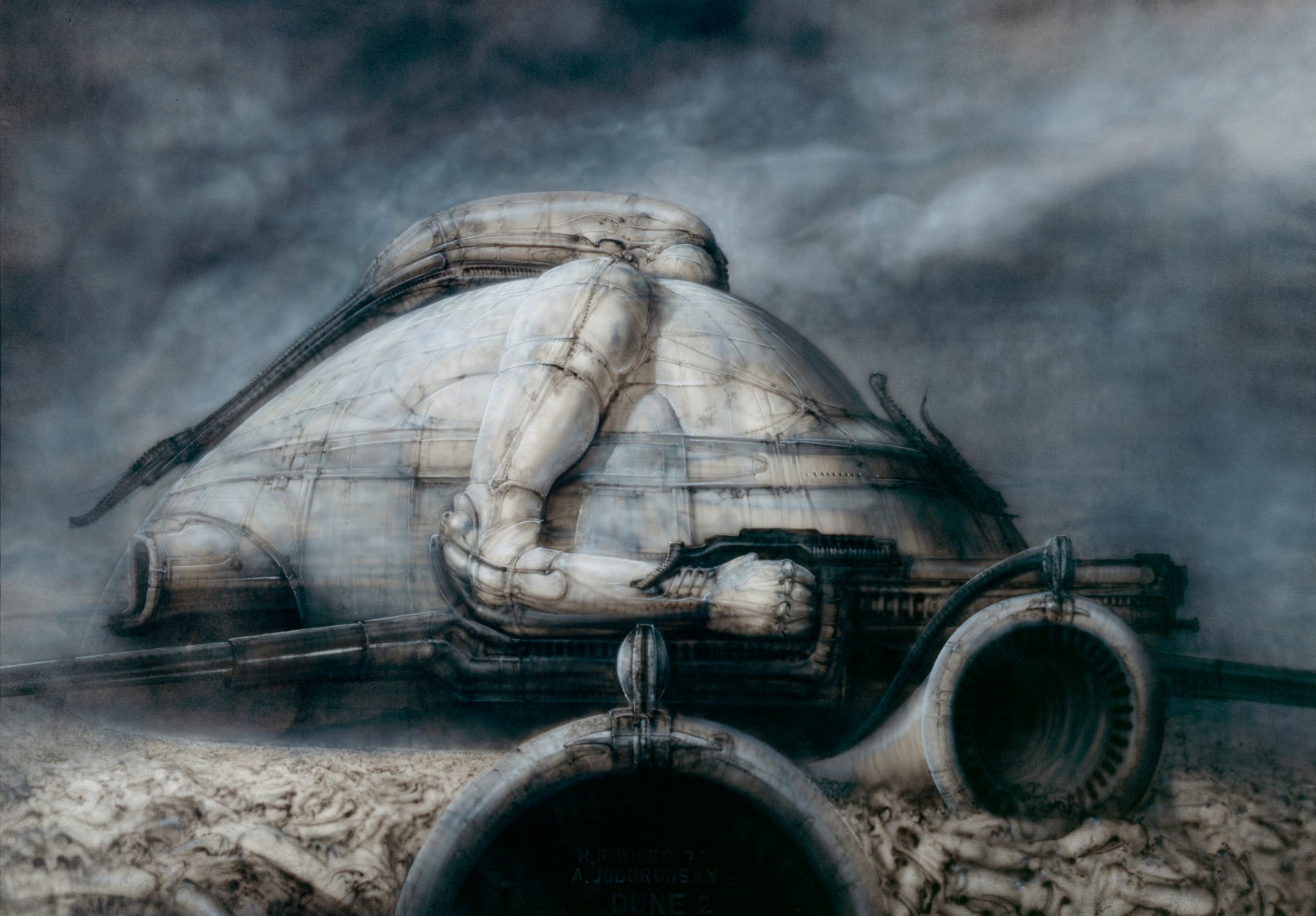
Then, in 1984, Dino De Laurentiis and Universal Pictures tried again, this time tapping writer/director David Lynch. Starring Kyle MacLachlan as Paul Atreides, Sean Young as Chani, and Sting (motherfucking Sting!) as Feyd-Rautha, along with Patrick Stewart as Gurney Halleck, and Dean Stockwell as Doctor Yueh, amongst others, Lynch’s Dune is one of those films that is basically the 80s personified.
It’s good. I certainly enjoy it for what it is, especially because it’s a Lynch film, but there’s no denying that it was a complete commercial and critical failure. People hated it. Which is kind of how things go with Dune adaptations…. people hate them, mostly because they just aren’t good. For a long time, much like Lord of the Rings was, Dune was one of those properties that was considered unfilmable.
Like an actual full live-action adaptation of Akira is…
But I digress. In a nutshell, I wouldn’t really recommend Lynch’s Dune to anyone. It feels like one of those things where you’ve either already seen it and you love it, or it’s just not going to happen, so why bother? Still, while he did have some quibbles, Frank Herbert was reportedly very pleased with the movie, so there’s that.
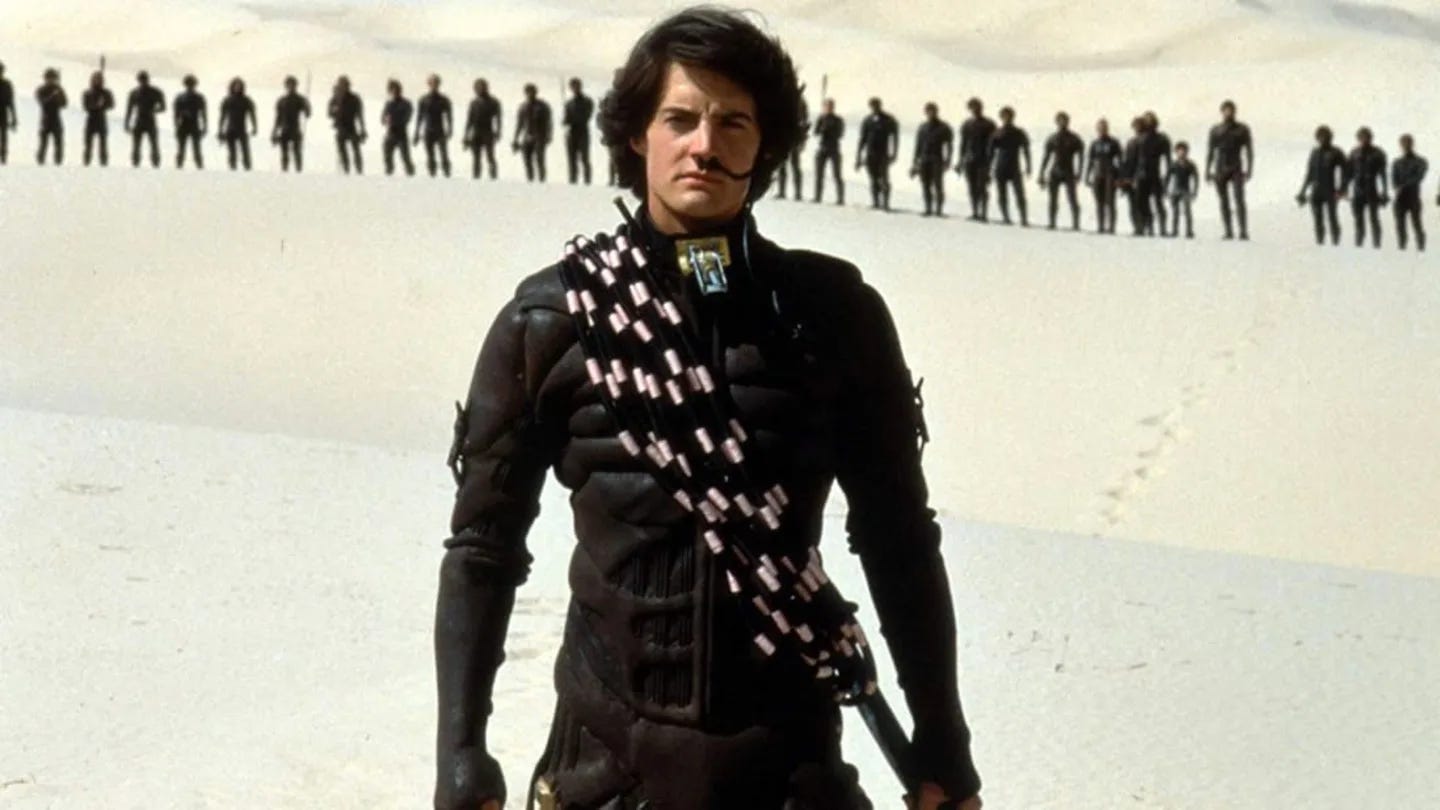
Then in 2000, the Syfy Channel made a three episode mini-series of Dune, an international co-production between Syfy and some production houses in Germany, Canada, and Italy. Starring basically no names at all, it was pure TV fare, made for possibly tens of dollars, and it showed.
Still, having freshly read the novel around that time, this mini-series was remarkably faithful to the book, so that was kind of cool, but yeah… it looked like a bad Star Trek knock-off, like even Babylon Five would’ve sneered at the sets.
The Director’s Cut was released on DVD in 2002, just fyi…
Then in 2003, the sequel Children of Dune was broadcast, and while it still looked like complete public access crap, it was not only one of the highest-rated programs ever to be broadcast on the Sci-Fi Channel, it won an Emmy for Outstanding Special Visual Effects, continuing Susan Lucci’s streak of never winning.
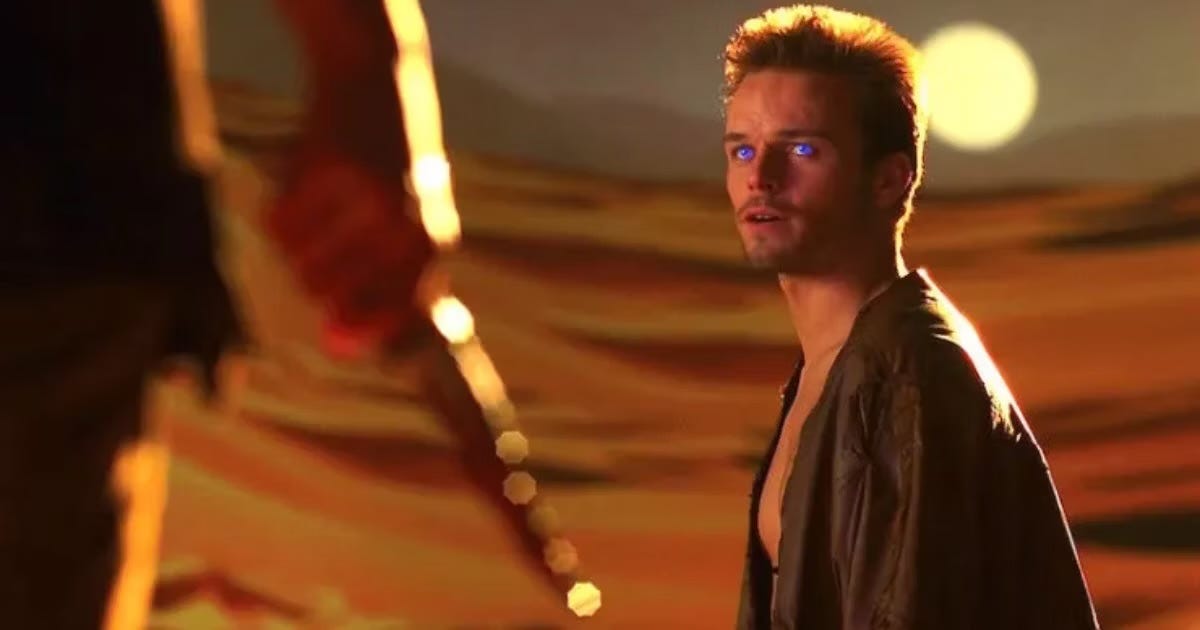
Finally, in 2008, Paramount tried for a third bite at the apple with a new feature film with Peter Berg set to direct, but Berg dropped out. After that, despite a few attempts to salvage the project, Paramount dropped the project in 2011.
This was probably for the best, if we’re being honest.
Because the fact that this version never came out, and it’s inevitable flopping wasn’t there to frighten the studios into deciding audiences don’t like sand or something, like they did after Mars Needs Moms flopped so they wouldn’t allow the film John Carter to use the word “Mars” in its title, this is probably how Denis Villeneuve was allowed to make such a massive two film spectacle of this franchise. Especially after his fantastic Blade Runner 2049 failed to find an audience.
Still, even with money, studio support, and talent, the success of a new Dune franchise was never a sure thing. Because as I’ve already said, there’s been multiple attempts at making Dune, but the quality of those attempts aside, there’s still one thing that has always seemed to be consistently true when it came to this franchise…
The majority of the public just could not give two fucks about Dune.
Outside of classic nerdom, Dune is just not a thing, or at least, that’s how it was, it’s more widely embraced now, but the reason it used to be like this, is that for forty plus years, they have been trying and failing to make a good Dune adaptation, and for all those years, it was obvious… people just weren’t interested.
I assumed that this time would be no different. I thought Part One would be a critical success, but an absolute bomb at the box office. Dune just isn’t a safe bet with modern audiences, it’s too easy to get bogged down in the obvious White Savior tropes, not to mention the undeniable Cultural Appropriation in its world-building, to see what else is going on in the story. Also, when it comes to putting ur-source material, like Dune, in front of the modern hoi polloi, often times it will be rejected as overly simplistic or too derivative. This is what happens when an unfamiliar audience finally engages with an older piece of art too long after too many of the things that drew their water from that older piece of art’s well have already entered the public eye. It’s just too late. The window is closed, the path that this piece of art blazed is now too well trod. On top of all that, since this is the first film of a two-parter, with the making of the second part wholly dependant upon the financial success of the first, I just figured that it wasn’t going to happen, that the second part would never be made, and this attempt would remain an incomplete, as a result, unsatisfying film forever, yet another failure in a long litany of failures.
But shame on me for not remembering…
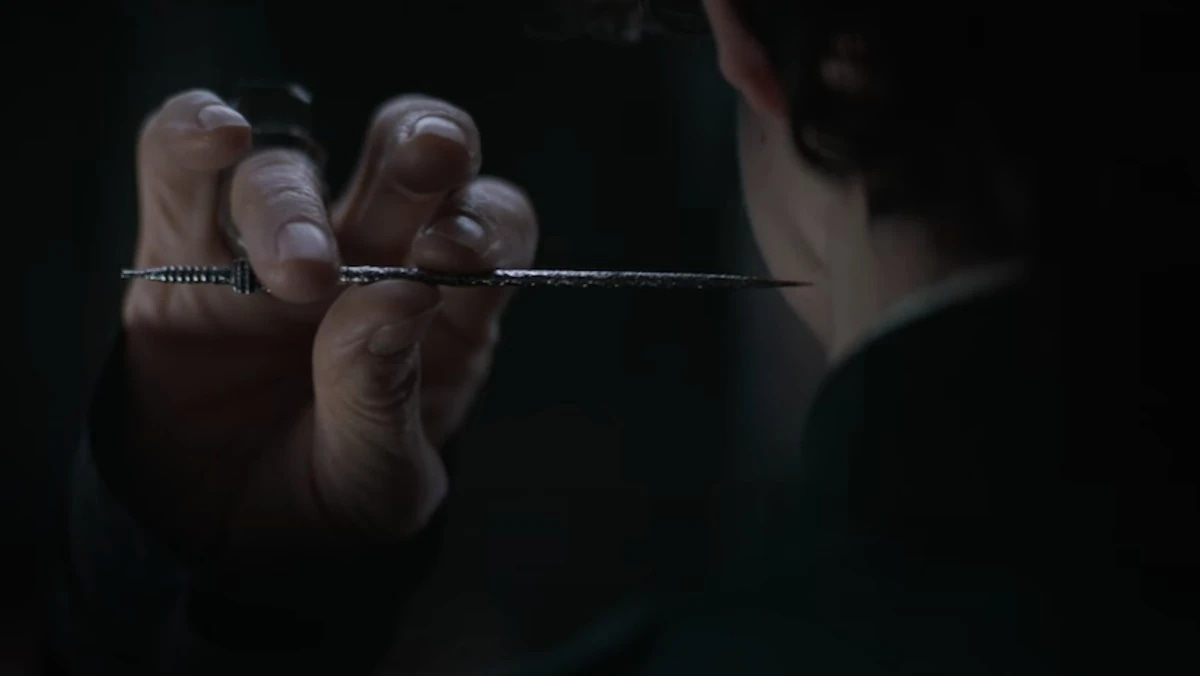
Standing here now on the far side, it’s clear to me that the reason why this new adaptation actually worked is Denis Villeneuve. Everything Zack Snyder tries to do, but completely fails at, when it comes to the look and feel of his atrocious Rebel Moon films, Villeneuve does with ease. Reminding me of Jackson’s Lord of the Rings films, he somehow manages to visualize the book’s often clunky prose perfectly, absolutely capturing the look in a way that feels exactly right, almost like it’s pulled directly from your head, or at least… my head, and all while feeling new. And while it’s doing this, it is also telling you where these places are, and what they mean, and who the people are who live there, but without outright telling you too. All this, while also being visually stunning at the same time. Villeneuve’s Dune walks the line between grandeur and pomposity in such a thrilling, awe-inspiring manner, and the best part is, not only does it hit all of the classic notes it needs to, but it takes its time doing it too.
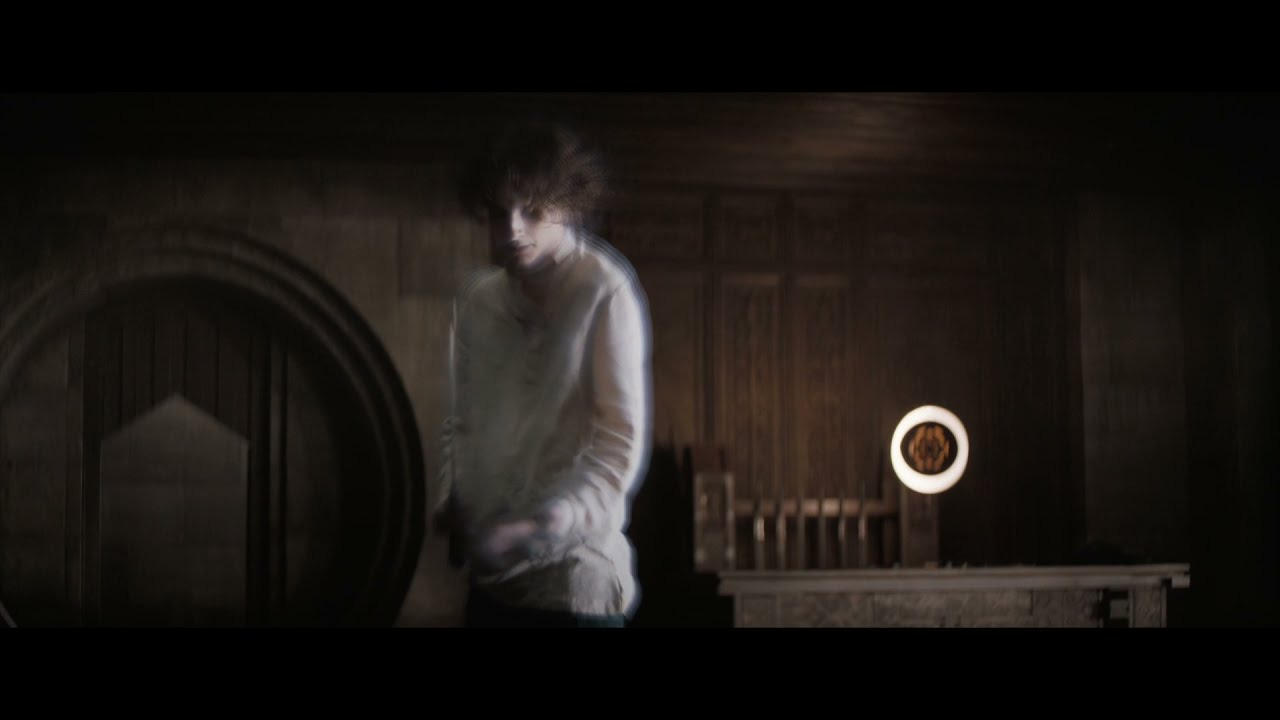
I loved it.
So yeah, Dune is set in the very distant future in a galaxy far, far away, I assume. I’m sure one of the books answers this, but wherever Earth is at this point, as far as I can tell, no one here is on it.
The main idea is that this story is taking place during a kind of Cold War amongst allies. The Emperor is mad at House Harkonnen, one of the Great Houses of the Landsraad, mostly because the Harkonnens are a family made up almost entirely of the worst people imaginable, all hailing from a trashheap industrial planet.
They’re huge assholes.
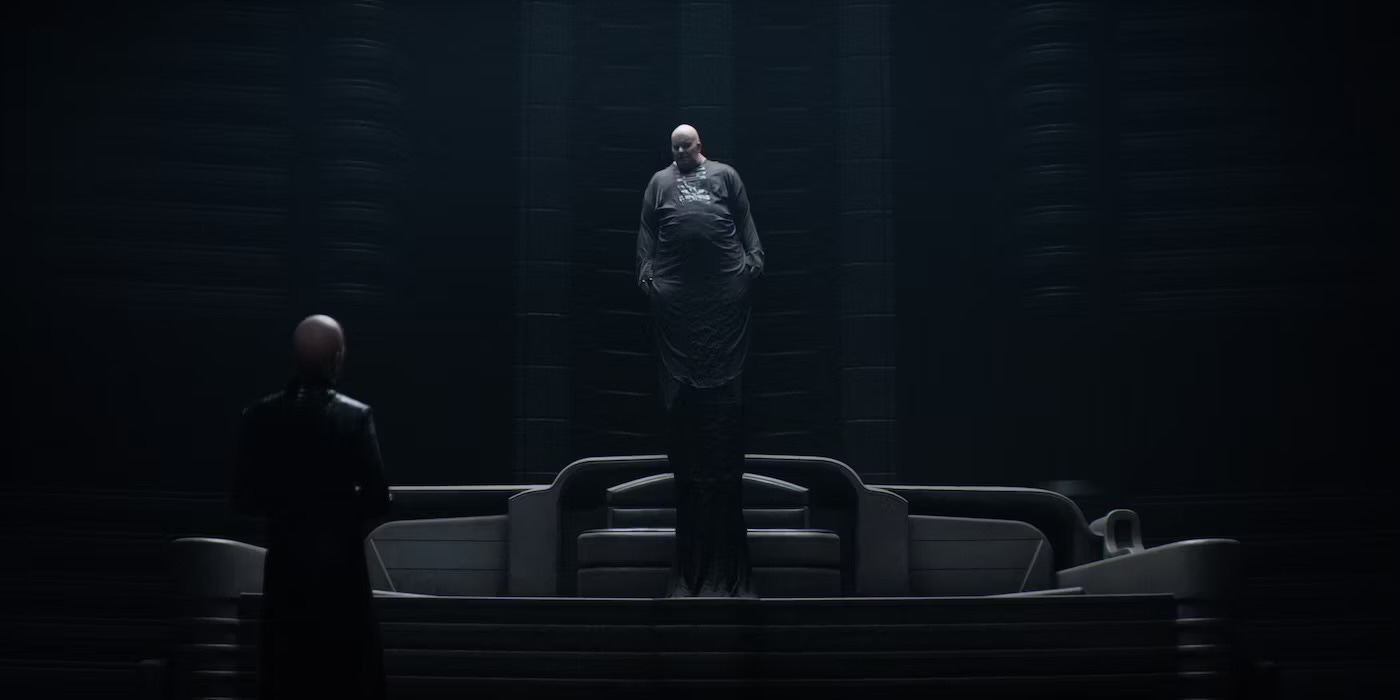
The Harkonnens oversee Arrakis, running spice production with an ruthless iron fist, but because The Emperor hates their whole House like a mean drunk hates a mangy dog, he decides to take Arrakis away from them. As Arrakis is gigantic money-making machine, this is a real kick in the teeth for the Harkonnens. It’s a huge fuck you, and the Harkonnens are powerless to do anything about it. Even worse, the Emperor then turns around, and gives Arrakis to House Atreides, another Great House, but House Atreides are not just one of House Harkonnen’s cheif rivals, they are also their most hated enemy. This is a huge humiliation.
BUT…
There’s an extra bit… y’see, the Emperor is upset with the Atreides too, they’re too loved, they’re too successful. Plus, in time, House Atreides could conceivably grow powerful enough to challenge the Emperor. So, the unspoken little extra bit tagging along with the Emperor’s big ol’ fuck you to House Harkonnen is this (to be said in a Christopher Walken voice): “Of course, if you were to take out House Atreides, all while allowing me plausible deniability… you can have Arrakis back.”
House Harkonnen is only too happy to oblige.
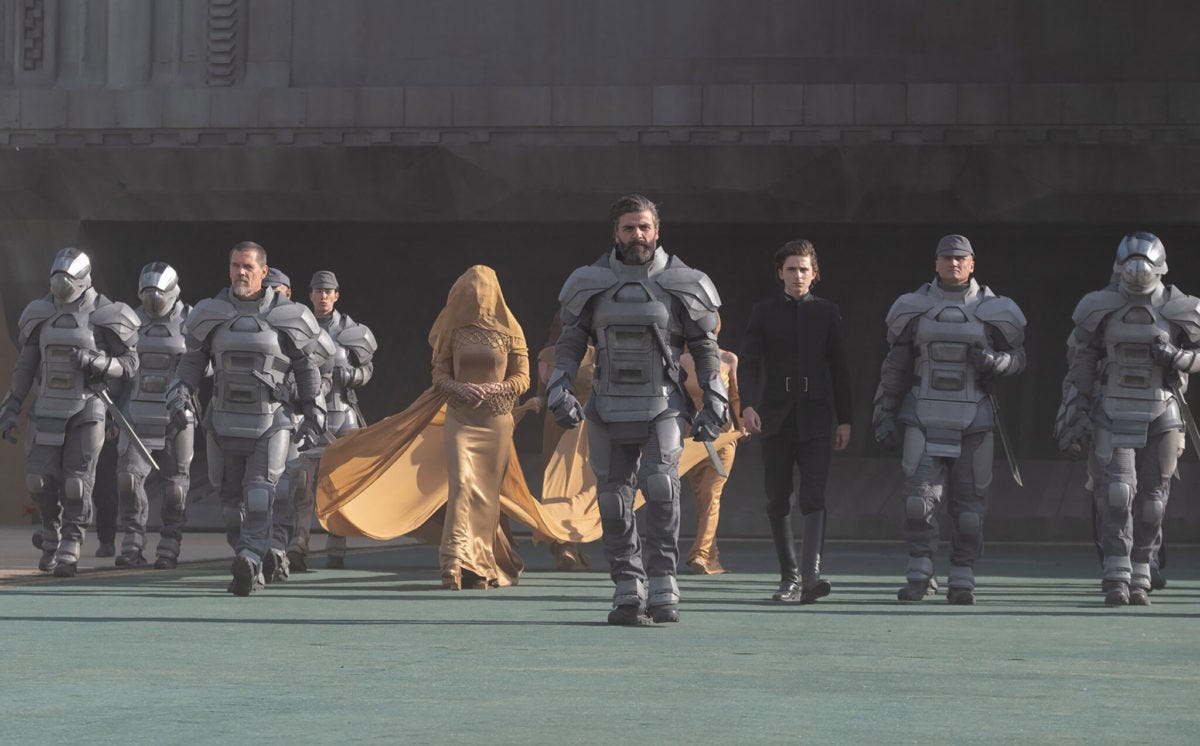
The Atreides are basically like the Starks.
They’re super loyal, super bad ass, super loved by the common folks, and generally would prefer to be left alone on their green and lovely planet of milk and honey. But like I said, they’re loyal, pretty much to a fault, so even though they know that the Emperor is only doing this because he hates them, and even though they know this gift is basically setting them up to get a Harkonnen knife in their backs, House Atredies accepts their duty and goes to Arrakis, tasked with making sure the spice continues to flow. There, they attempt to rule the indigenious population through mutual respect and acknowledgement, all while trying to build a power base that will shield them from the sword of Damocles hanging over their heads.
But like the Starks, they aren’t quick or ruthless enough. When the Harkonnens attack in the dead of night, they are cut down and scattered to the wind.
Luckily for House Atreides, if not the Known Universe and the Corrino Empire, there’s other forces at play here.
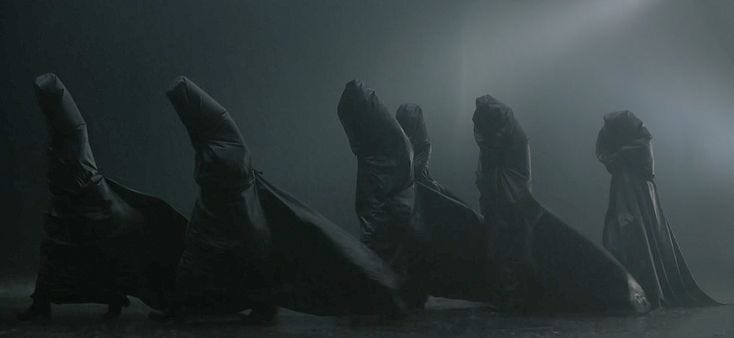
The Bene Gesserit Order pull the strings on the Known Universe.
Weaving the fate of humanity from behind the scenes, manipulating, pushing, and snuffing out as they deem necessary, the Bene Gesserit manage the direction in which the future of humanity grows. Operating from behind an almost impenetrable shadow of ritual mysticism and mystery, the Sisterhood is an ancient sect of advisors, spies, and scientists employing a carefully considered plan of political interference, genetic experimentation, and religious-based cultural engineering, all for the good and the survival of humanity as they see it, all while furthering their own agenda of ascending the human race by bringing about the advent of their chosen one, a man known as the Kwisatz Haderach.
It is because of The Bene Gesserit Order that Paul Atreides, the son of Duke Leto Atreides, and one of the few survivors of the Harkonnen’s attack that wiped out most of his House, becomes the rebel leader known as Muad'Dib. In essense, Paul flees into the desert, the ruins of his House burning behind him, and there, he becomes The One, in all the classic ways.
But it is a mantle that he does not want.
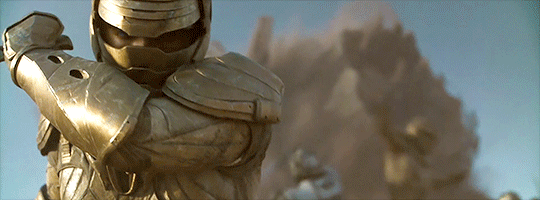
And the question lingers… is he truly The Kwisatz Haderach?
The Kwisatz Haderach is intended to be a messiah, a prophet, a kind of superbeing. He is meant to help the Bene Gesserit access more knowledge and power. That’s it, in a sentence anyway. Whatever that means. He’s basically meant to be a fulcrum on the entire Known Universe, massive irrevocable change given flesh.
Seeing The Kwisatz Haderach as a tool to wielded by them, the Bene Gesserit have been laying the path for this mythical figure for tens of thousands of years, all through selective breeding. Their plan was meant to finally come to fruition with the breeding of Duke Leto Atreides’ daughter to Feyd-Rautha, the nephew of Baron Harkonnen, in order to unite the houses. But Lady Jessica, a Bene Gesserit agent placed as consort to Duke Atredies decides, because she loves Leto so, to say fuck all that noise, and give Leto the son he desires, potentially bringing about the messiah a generation too early.
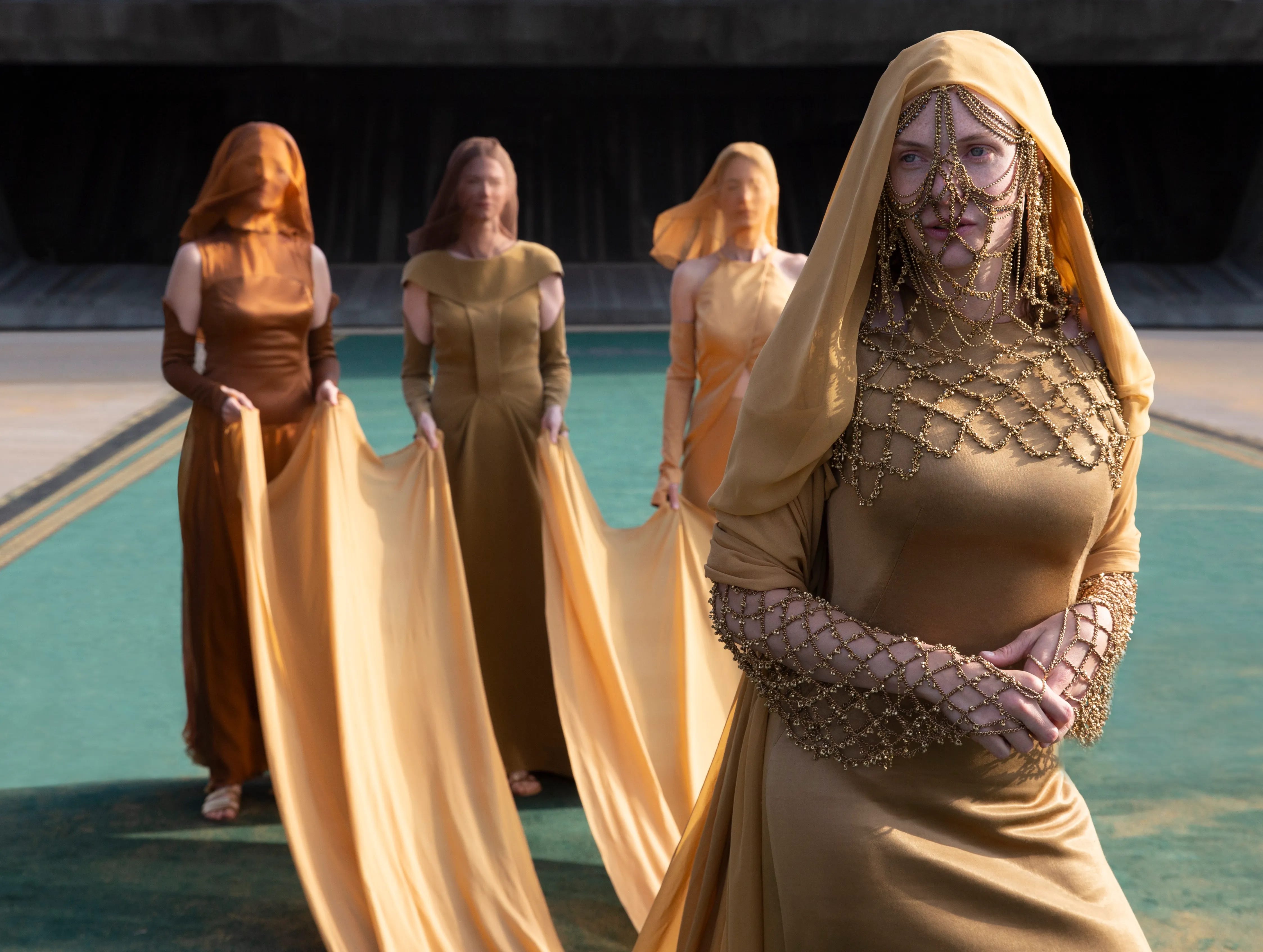
Needless to say, the Bene Gesserit were not happy about this.
Still, these are plans that were formed over long generations upon long generations, so all is not lost. The Bene Gesserit laid the groundwork for The Kwisatz Haderach’s ascension long, long ago. So, when House Atreides first arrives on Arrakis, they find that the prophecy of the Lisan al Gaib, the Voice from the Outer World, the Giver of Water, is already there, and waiting for them, deeply embedded within the culture of the indigenious population, a people known as the Fremen.
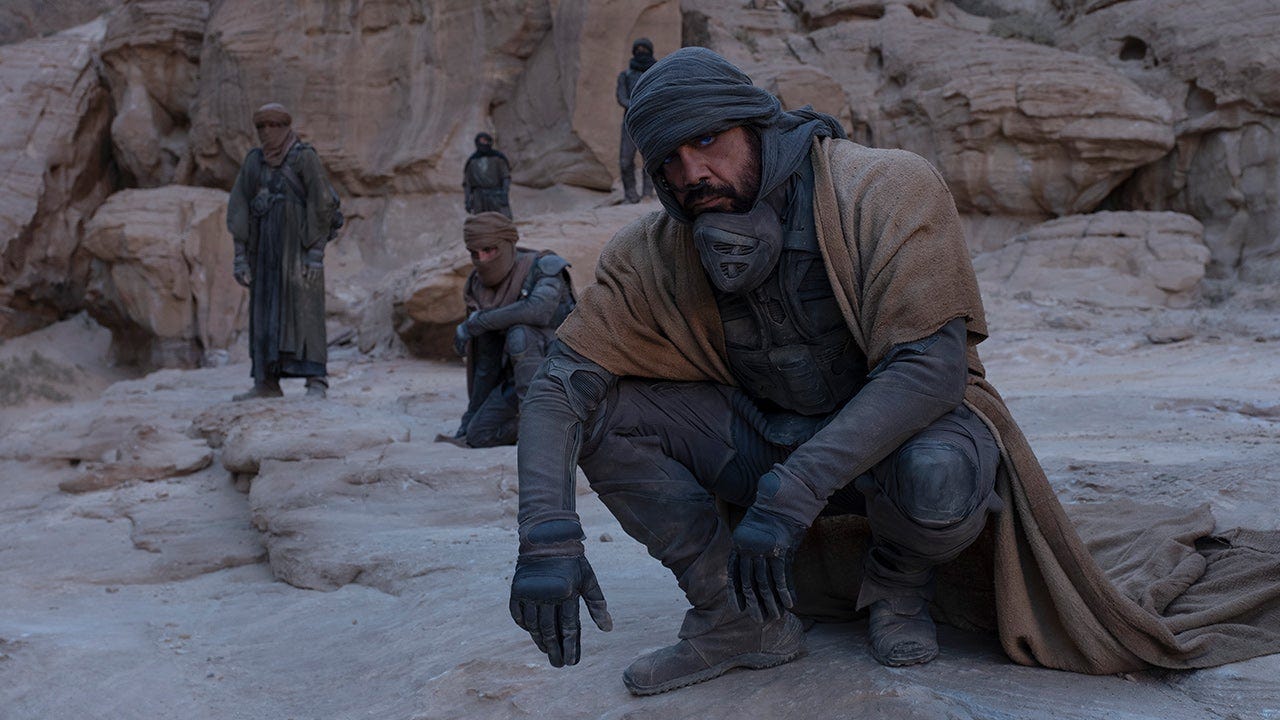
Long considered a small population of backward savages by The Empire—as well as by the planet’s former invading colonizer masters, the Harkonnens—the Fremen are in fact, super bad ass warriors, and there’s a whole bunch of them ready to go to war. The Fremen easily survive in Arrakis’ inhospital climate by wearing bodysuits called Stillsuits, which allow them to pee their pants whenever they want, and then to safely drink that pee in a pretty much endless cycle, over and over and over again.
They also ride the huge sandworms that live on Dune, known as Shai-hulud.
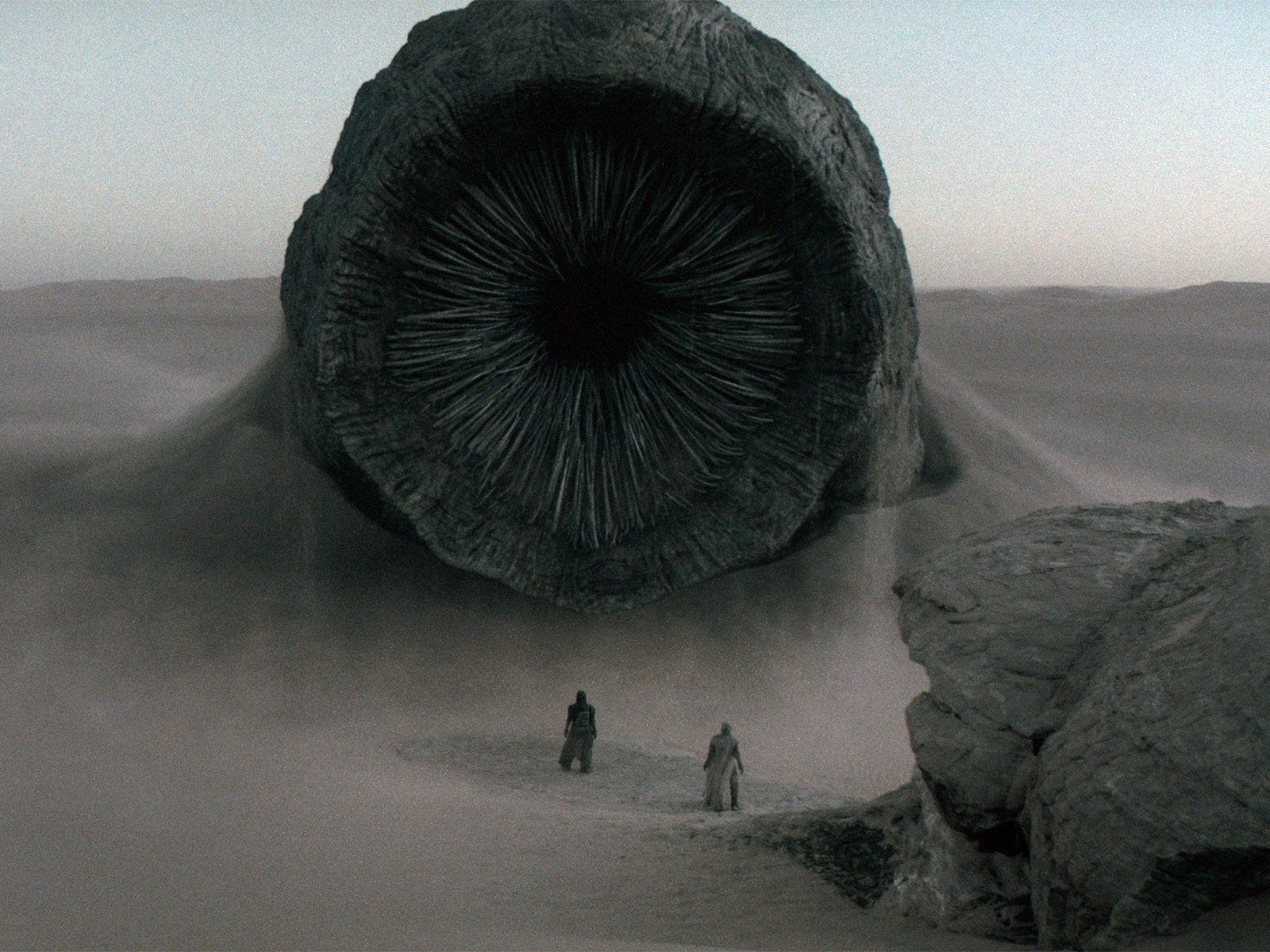
The Shai Hulud are gigantic. Huge. Some growing four to five football fields long, and at least a couple of stories tall, they are a force of nature, practically indestructible and swallowing everything in their path.
The worms are attracted to vibrations on the sand, so the Fremen use devices call Thumpers, which do exactly what you’d assume they do, and then when the worms show up, the Fremen throw grappling hooks on them, climb up their sides, and then steer the worms by using the hooks to pull back a plate of the worm’s armor, exposing it to sand. The irritation of the sand on their soft wormy underbelly causes the worms to turn away from it, and in the direction the Fremen want the creature to go. It’s pretty cool, but I always wonder…
How do they get off the worms? I don’t think they ever show that.
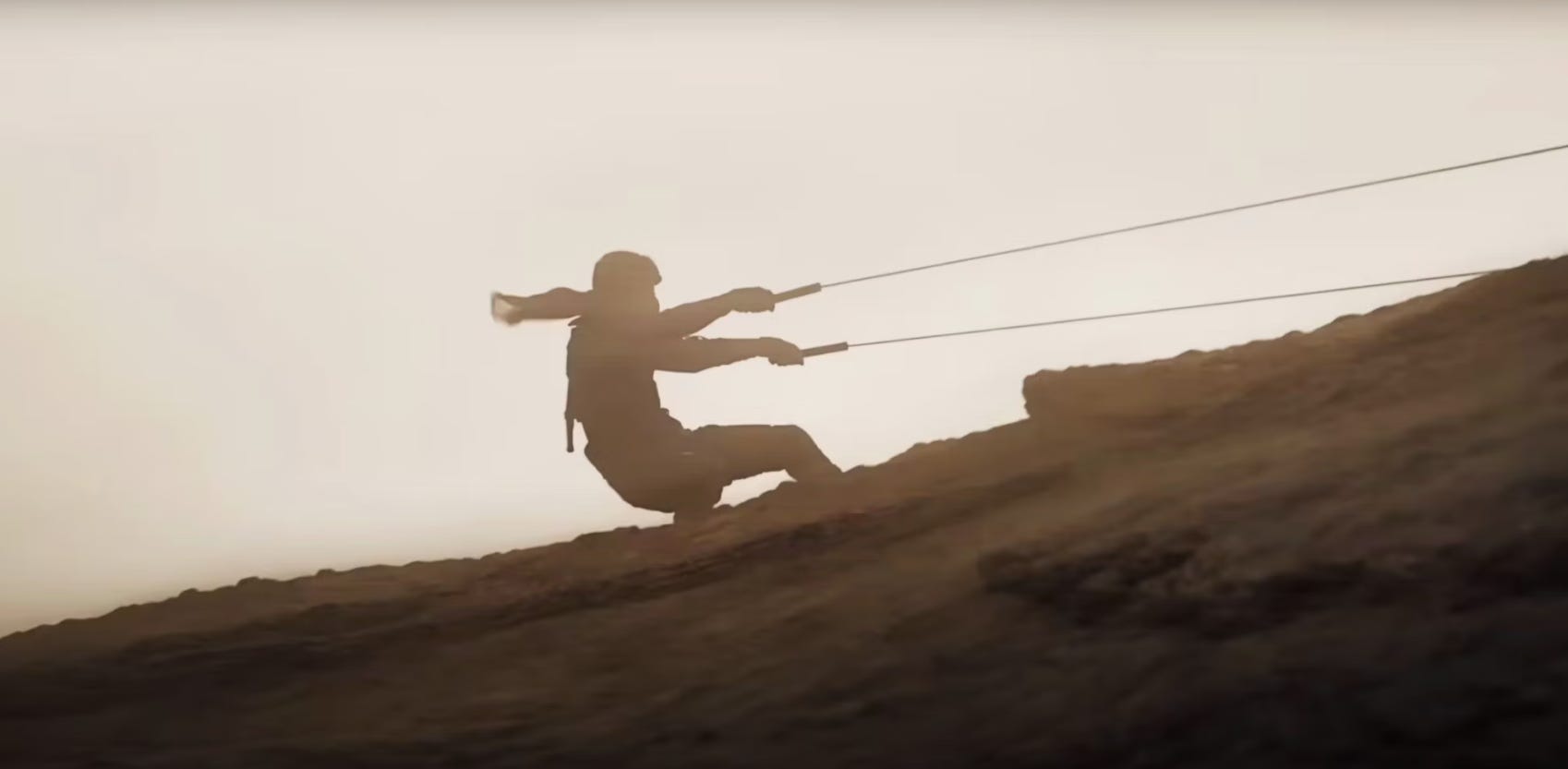
Anyway…
"So, you got these centers of power, and it doesn't matter a damned bit how pure and good the hero is. By just being there, he creates a power structure, so its like a magnet; the iron filings, the corruptible, they come in, and things are done in the name of that leader—as they were done in Christianity, in Islam, in Buddhism, in all the major and lesser religions, things are done in the name of the leaders, and amplified by the members, who follow without thinking, without questioning, and wind up in Guyana drinking poisoned Kool-Aid. I wanted to create a charismatic leader, a Messiah you would follow for all of the right reasons. He is loyal to his people, he's honorable and true to his friends. Every characteristic you could possibly think of, including the prince in search of the grail, is there in that character—you would follow him right into Camelot. And once there, a power structure grows up around him; that's what we deal with in the second book. That shook alot of people. Here was a hero who didn't make everything all right. He created a power structure, and he did it by just being there."
— Frank Herbert, on Dune
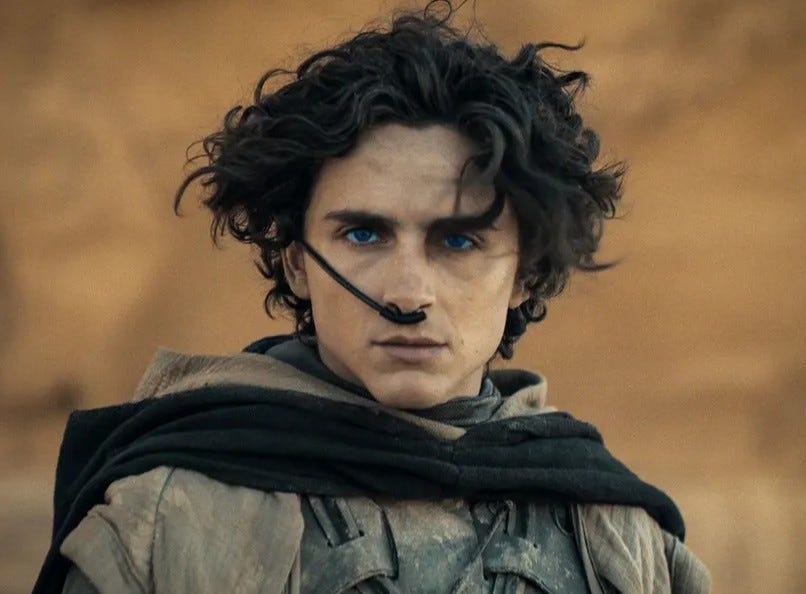
Telling the origins of the coming of a great prophet, a man who would one day burn half the galaxy, while exploring the consequences of power, and the struggle between duty and destiny, Herbert’s use of political intrigue, ecology, and religion creates an immersive world that feels both familiar and alien, and this comes through clearly in Villeneuve’s film. It’s fantastic work. Not only is the look and feel of this film perfect, but you can see the seeds being laid that will ultimately lead to a story of how even the most well-intentioned individuals can become corrupted by power, simply because the pursuit of power always has consequences.
Also, it’s just cool, the fighting, the technology, the whole look, all that kind of stuff? It’s just super cool.
So yeah, I loved it.
But yes, I’ll admit it… it’s a long film, and definitely not for everyone. Judging by the tone of the complaints I saw, perhaps worst of all for most people is the fact that this is the first film of a two-parter, and so many were apparently not prepared for the fact that this film does not tell a complete story. I don’t know what you can possibly do for the people who were super mad about this, other than to maybe remind them that an informed consumer generally does not end up looking like a dipshit rube, but then again, they might not appreciate that…
Anyway, in the end, for those of you out there who love your pulpy sci-fi, for those of you out there who love your epic high fantasy, you probably already know that this is a genre all-timer. And for those of you who love Dune, and have been waiting, I’m really glad to say that Villeneuve was able to break the streak.
He finally made an actually good adaptation of Dune.
